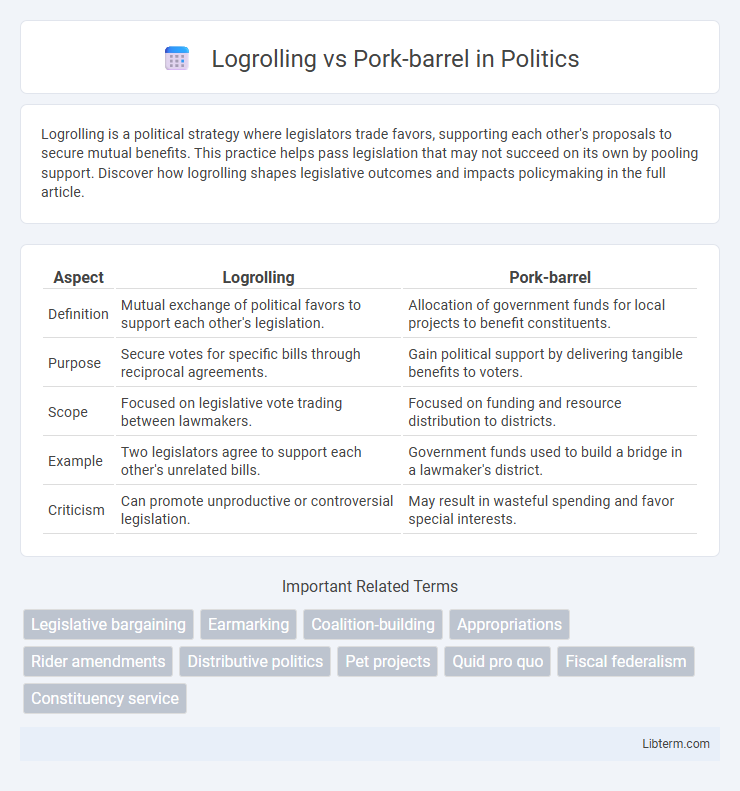Logrolling is a political strategy where legislators trade favors, supporting each other's proposals to secure mutual benefits. This practice helps pass legislation that may not succeed on its own by pooling support. Discover how logrolling shapes legislative outcomes and impacts policymaking in the full article.
Table of Comparison
| Aspect | Logrolling | Pork-barrel |
|---|---|---|
| Definition | Mutual exchange of political favors to support each other's legislation. | Allocation of government funds for local projects to benefit constituents. |
| Purpose | Secure votes for specific bills through reciprocal agreements. | Gain political support by delivering tangible benefits to voters. |
| Scope | Focused on legislative vote trading between lawmakers. | Focused on funding and resource distribution to districts. |
| Example | Two legislators agree to support each other's unrelated bills. | Government funds used to build a bridge in a lawmaker's district. |
| Criticism | Can promote unproductive or controversial legislation. | May result in wasteful spending and favor special interests. |
Introduction to Logrolling and Pork-barrel
Logrolling refers to the practice where legislators exchange support for each other's bills, ensuring mutual benefit by trading votes to pass legislation. Pork-barrel spending involves allocating government funds to localized projects designed to please constituents and secure political support. Both strategies play crucial roles in legislative negotiation and securing political leverage.
Defining Logrolling in Politics
Logrolling in politics refers to the practice where legislators exchange support for each other's bills or projects to secure mutual benefits, often to advance local or special interests. This practice differs from pork-barrel spending, which specifically involves allocating government funds to local projects to win voter support. Logrolling serves as a strategic bargaining tool to build coalitions and pass legislation that might otherwise struggle to gain majority approval.
Understanding Pork-barrel Spending
Pork-barrel spending refers to the allocation of government funds for localized projects secured primarily to benefit a legislator's constituents and enhance their chances of reelection. It typically involves directing government expenditures to specific districts through earmarks or rider bills without widespread national interest. Unlike logrolling, which involves trading support for different proposals among legislators, pork-barrel projects focus explicitly on visible, tangible benefits tied to a representative's home area.
Historical Roots of Logrolling
Logrolling traces its origins to early American legislative practices where lawmakers exchanged support for each other's bills to secure mutual benefits. This strategic vote trading emerged prominently in the 19th century as a means to navigate the growing complexity of regional interests within Congress. Understanding logrolling's historical roots clarifies its role in shaping modern political negotiation and coalition-building.
Notable Examples of Pork-barrel Projects
Pork-barrel projects often involve funding for local initiatives such as the Alaska Highway Act, which secured extensive federal money for construction in Alaska, benefiting local constituencies. The Big Dig in Boston serves as another prominent example, where federal funds were allocated for highway improvements primarily benefiting the city's infrastructure. These projects contrast with logrolling, where legislators trade votes on each other's bills rather than directly securing earmarked spending for their districts.
Key Differences Between Logrolling and Pork-barrel
Logrolling involves legislators exchanging support for each other's proposed bills to secure mutual benefit in passing legislation, emphasizing reciprocal agreements. Pork-barrel spending refers to allocating government funds to localized projects designed to please constituents and win votes, focusing on tangible local benefits. The key difference lies in logrolling's emphasis on vote trading across unrelated bills, while pork-barrel prioritizes securing funding for specific district-centered initiatives.
Impacts on Legislative Processes
Logrolling enhances legislative efficiency by enabling lawmakers to exchange support for each other's bills, promoting cooperation but sometimes leading to the passage of less scrutinized or non-merit-based policies. Pork-barrel spending directs government funds to local projects benefiting specific constituencies, often increasing budget allocations at the expense of broader fiscal priorities and contributing to legislative gridlock over competing demands. Both practices influence legislative dynamics by shaping negotiation tactics and resource distribution, affecting transparency and the overall policy quality in the lawmaking process.
Public Perception and Criticism
Logrolling often faces public criticism for promoting legislative deals that prioritize personal or political gain over constituent interests, leading to perceptions of inefficiency and corruption. Pork-barrel spending is widely viewed as wasteful government expenditure, fostering negative opinions about misuse of taxpayer funds and favoritism toward local projects with limited national benefit. Both practices contribute to skepticism about political integrity and transparency, undermining trust in democratic institutions.
Reforms and Regulatory Measures
Logrolling involves legislators exchanging support for each other's proposals, often facilitating the passage of projects tied to specific constituencies, which can hinder comprehensive reforms by prioritizing localized benefits. Pork-barrel spending directs government funds to specific regions or projects, frequently resulting in inefficient resource allocation and necessitating regulatory measures to increase transparency and accountability. Reforms targeting logrolling and pork-barrel practices focus on enhancing legislative ethics, tightening budgetary oversight, and implementing stricter disclosure requirements to reduce favoritism and promote equitable policy outcomes.
Conclusion: Future Trends and Best Practices
Logrolling and pork-barrel spending continue to influence legislative decision-making, but future trends indicate a shift toward greater transparency and accountability driven by digital oversight tools and public demand for ethical governance. Best practices emphasize clear documentation of agreements, rigorous impact assessments, and enhanced stakeholder engagement to balance local interests with national priorities. Embracing these approaches helps mitigate risks of corruption while fostering collaborative policymaking in a more informed legislative environment.
Logrolling Infographic

 libterm.com
libterm.com